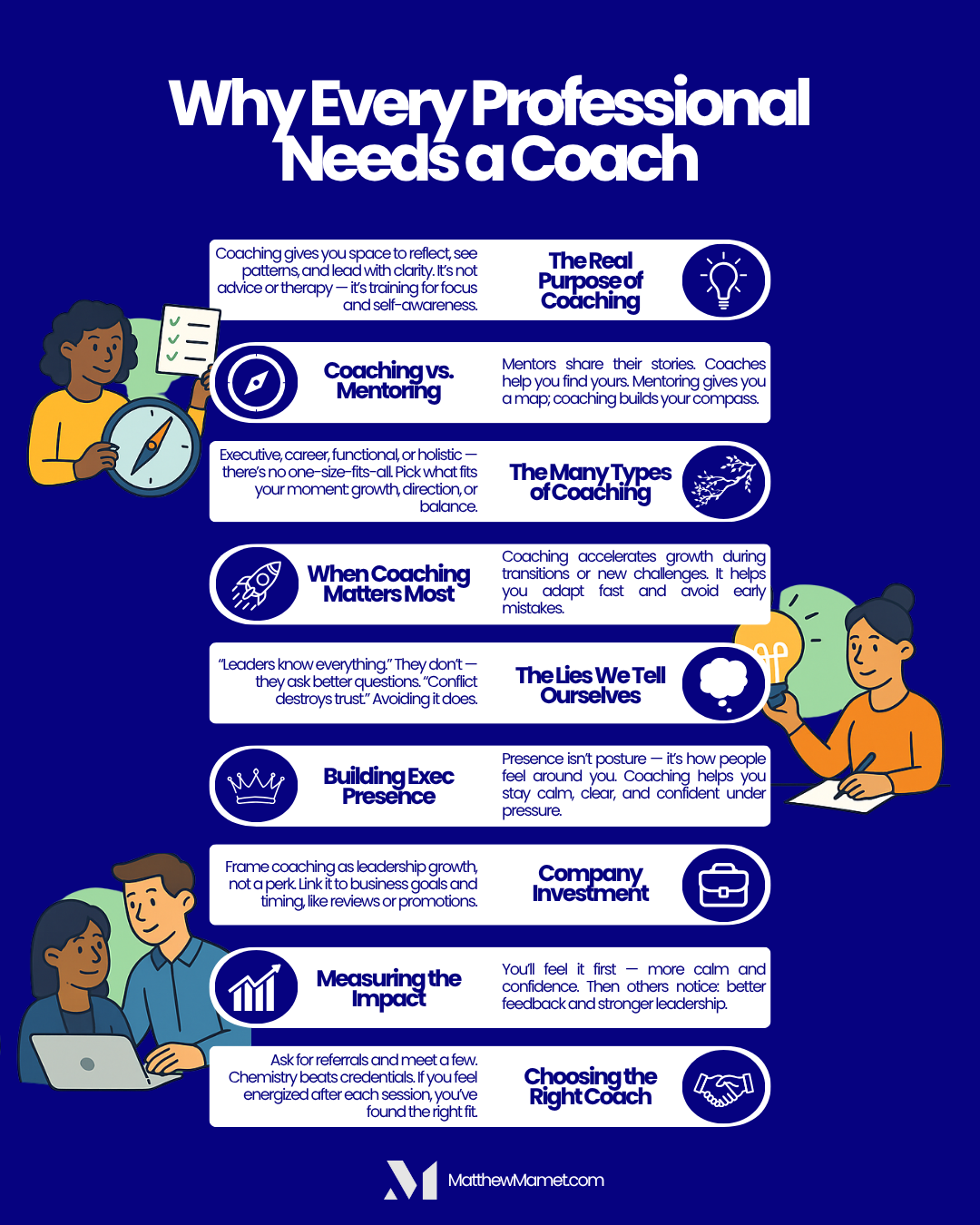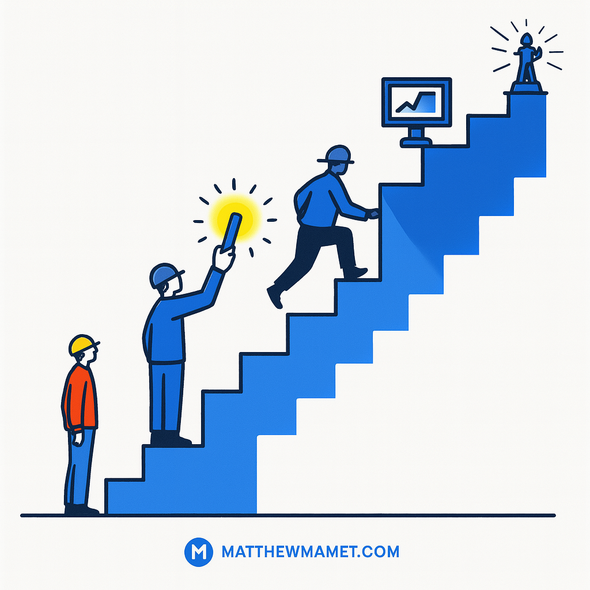There’s a quiet shift happening in how ambitious professionals grow. The people who are truly accelerating in their careers - not just moving up, but becoming more confident, composed, and capable - almost always have one thing in common: they’re working with a coach.
Coaching isn’t about fixing what’s broken. It’s about building what’s next.
The Real Purpose of Coaching
At its heart, coaching is structured reflection. It’s the rare hour where you step out of the noise, put your phone down, and look in the mirror with someone trained to help you see patterns - not just problems. A good coach doesn’t tell you what to do. They ask the kinds of questions that make you stop and think, “Why do I keep doing it that way?”
The goal isn’t therapy. It’s not even advice. It’s building the muscle of self-awareness and intentionality - the ability to see yourself clearly enough to lead with purpose.
Coaching is work. The kind that’s sometimes uncomfortable, occasionally emotional, but always useful. It’s the treadmill you don’t want to get on but are glad you did afterward.
The Difference Between Coaching and Mentoring
People often confuse coaching with mentoring. They’re not the same thing.
Mentors tell stories. They share what worked for them, how they handled a tough decision, or how they navigated a company’s politics. That’s valuable, but it’s still their story.
A coach helps you write yours. They help you find your blind spots, unpack what’s really driving your choices, and get unstuck in ways that stick. It’s the difference between someone giving you a map and someone helping you build a compass.
The Many Flavors of Coaching
There’s no one-size-fits-all version of coaching. Executive coaches work with leaders who are scaling themselves to match their growing teams. Career coaches help people navigate transitions, promotions, and pivots. Functional coaches sharpen your craft - whether you’re in product, design, sales, or marketing. And then there are holistic coaches who take a full-picture view, connecting your work, values, and personal energy into something more sustainable.
The key is to know what kind of help you need. If you’re overwhelmed by scope, a leadership coach might be right. If you’re feeling stuck in your career, a career coach can help you find the next direction. And if you’re spinning in burnout, a holistic coach can help you rebalance the system.
When Coaching Matters Most
There are a few moments when coaching has an outsized impact.
Starting a new job is one of them. You walk in with optimism, but also a quiet fear that you don’t know what you don’t know. A coach helps you shorten the learning curve and avoid the early mistakes that can define how others perceive you.
Another critical moment is after a promotion or scope jump. Organizations often promote first and figure it out later. Suddenly you’re managing more people, owning a larger portfolio, or sitting in rooms where the conversation is less about doing and more about influencing. The rules have changed, often without anyone telling you. Coaching helps you learn that new game before the stakes get too high.
And sometimes, the moment for coaching comes when nothing seems to be working. You’re putting in the hours, doing what’s always worked, but not getting traction. That’s when an outside perspective can reveal that the problem isn’t your effort - it’s your angle.
The Lies We Tell Ourselves
Coaching has a way of surfacing the stories we tell ourselves - the invisible beliefs that quietly limit growth. Three come up again and again:
“Leaders know everything.” They don’t. The best leaders are the most curious ones. They ask better questions, not because they know the answers, but because they’re confident enough to admit they don’t.
“Work speaks for itself.” It rarely does. Visibility and influence are part of the job. Coaching helps you learn to tell your story without sounding self-promotional - to connect the dots for others before they draw their own conclusions.
“Conflict destroys relationships.” Avoiding conflict does. Productive conflict, done right, deepens trust. A coach can help you separate discomfort from danger and build the confidence to engage in the hard conversations that move things forward.
Building Executive Presence
One of the most common coaching goals is “executive presence.” But presence isn’t a trick. It’s not posture or tone or wardrobe. It’s about how you make people feel when you walk into the room.
Presence is calm when others rush. It’s clarity when things are messy. It’s confidence without ego.
It starts with slowing down. Presence lives in the pause between reaction and response. It’s choosing to speak in headlines instead of paragraphs - to start with the conclusion, not the caveats. It’s being open to feedback before it finds you, and staying steady when the stakes get high.
People follow leaders who make them feel safe and focused. Coaching helps you become that kind of leader.
Getting the Company to Pay for It
Here’s a practical truth: most companies already have professional development budgets. The challenge is making the case.
The key is to link it to business outcomes. Don’t frame it as “I’d like coaching.” Frame it as “I’m stepping into a bigger role, and I want to make sure I’m leading at the level the business needs.” You’re not asking for a perk - you’re making an investment in better leadership.
Timing helps. After a promotion, during a review cycle, or while onboarding into a new company are all moments when the incentives align.
If there’s hesitation, suggest a pilot - three months, shared cost, specific goals. HR and Learning teams often have relationships with coaches already; it’s worth asking. And if the answer is no, you’ve still signaled something important: you’re serious about growth.
Measuring the Impact
The ROI of coaching shows up in more ways than one.
The first signal is how you feel - more grounded, confident, clear. Then, other people start noticing. Feedback shifts. Colleagues comment that you seem calmer, or sharper, or just easier to follow. Eventually, it shows up in metrics - better performance reviews, stronger team engagement, even promotions.
Some companies use 360 surveys before and after coaching engagements to measure growth across communication, influence, and leadership behaviors. But the best evidence is simple: you feel different, and people around you start responding differently too.
Choosing the Right Coach
Finding the right coach is as much art as science. Start with referrals. Ask peers you trust who they’ve worked with. You’ll be surprised how many quietly have a coach but never talk about it.
Meet a few. Chemistry matters more than credentials. After that first call, pay attention to your gut: when you see their name pop up on your calendar, do you think “ugh, I have to do this,” or “good, I need this”?
That feeling is the best signal you’ll get.
Getting Started
Coaching doesn’t hand you answers. It helps you hear your own - the ones that get buried under busyness and pressure. It’s not about changing who you are. It’s about becoming more of yourself, on purpose.
Ready to drive more growth & achieve bigger impact?
Leverage my 25+ years of successes and failures to unlock your growth and achieve results you never thought possible.
Get Started




